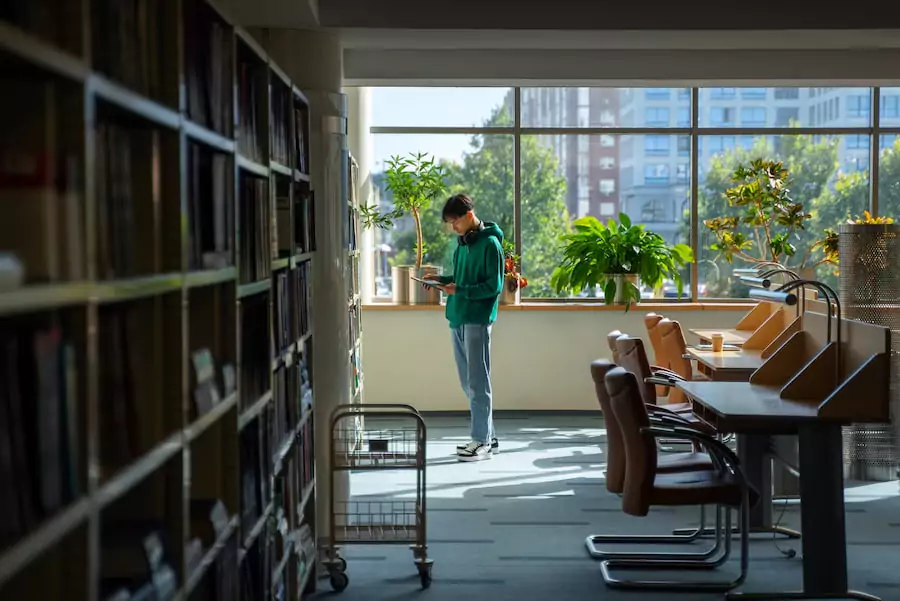Julian Shen-Berro of Chalkbeat New York has voiced a concerning issue which is currently unfolding in New York City’s public school system. A significant number of schools lack an essential component of the educational framework: librarians.

✅ AI Essay Writer ✅ AI Detector ✅ Plagchecker ✅ Paraphraser
✅ Summarizer ✅ Citation Generator

This problem, often overlooked, could have severe consequences for student learning. But why is this happening and what does it mean for the future of our students?
Key Takeaways:
- Librarian Shortage: NYC’s 1,600 schools have only 260 certified librarians, with high-poverty schools hit hardest.
- Impact on Education: Lack of librarians hampers students’ reading, research skills, and media literacy, widening educational gaps.
- Policy and Budget Issues: Policy changes and budget constraints have led to libraries being sidelined in schools.
- Addressing the Problem: The “Teacher 2 Librarian” program aims to boost librarian numbers, but dwindling positions might deter prospects.
According to the education department officials, only around 260 certified librarians serve the largest school system in the nation, encompassing over 1,600 schools. Particularly affected are high-poverty schools, where budget constraints often lead to the absence of librarians. The problem isn’t isolated to New York; Philadelphia, for instance, reported only 10 certified school librarians in 2020.
“It’s a quiet problem,” says Jenny Fox, a parent and children’s book author. “Half the parents at our school didn’t even know we didn’t have a librarian — people just assume that comes with a school.”
Roots of the Problem
The issue has roots in policy changes and financial constraints. Under former Mayor Michael Bloomberg, the city began trending towards smaller schools. These schools, due to their reduced student count and shared facilities, often found libraries to be an expendable luxury when budgeting became tight.
“The library is often a thing that’s on the chopping block, because it isn’t seen as essential as a cafeteria, for example,” says Emily Drabinski, president-elect of the American Library Association.
Impact on Student Learning
Research shows that the absence of librarians can be detrimental to students’ academic performance. Librarians don’t just foster a joy for reading; they also help students develop vital research and media literacy skills.

“In New York City, we’re always promoting college and career readiness,” says Arlene Laverde, New York Library Association president and a school librarian at Townsend Harris High School in Queens. “But what college students do you know that don’t do research?”
Addressing the Issue
Despite the troubling statistics, efforts are underway to combat this issue. The city’s “Teacher 2 Librarian” program is working to increase the number of certified school librarians, with 18 new candidates currently preparing to join. However, Laverde expresses concern that the decreasing number of librarian positions may deter prospective librarians.
The situation paints a stark picture: libraries and librarians are not a luxury, but a necessity. The absence of librarians disproportionately impacts students of color and those from low-income families, further exacerbating the disparity of education in the city.
“Libraries are not a luxury for our students. Libraries are a necessity,” asserts Zalykha Mokim, a school librarian at Newcomers High School.
The question remains: Can NYC turn the tide and give its students the library resources they so crucially need?
The State of School Librarians in New York City Public Schools: Key Statistics
This is an overview of the presence and distribution of certified school librarians across the New York City public school system, as well as comparisons with other cities like Philadelphia. It highlights the alarming gaps in librarian staffing, particularly in high-poverty schools, despite the recognized importance of their roles for student development and academic achievement.
| Key Statistics | Details |
| Total NYC schools | 1,600 |
| Certified school librarians in NYC | 260 |
| Percentage of high-poverty schools without a librarian on budget | Not specified, but higher than average |
| Certified school librarians in Philadelphia (2020) | 10 |
| NYC secondary schools with over 700 students | Required to have a full-time certified librarian |
| Percentage of NYC schools with over 700 students but no librarian | Nearly 33% |
| Schools with high poverty rates (>75%) without a budgeted librarian | Over 81% |
NYC’s public schools face a significant problem: a lack of librarians. Rooted in policy changes and financial constraints, this issue has far-reaching implications for student learning and academic performance. Efforts are being made to address this problem, but the question of their efficacy remains to be seen. As the city moves forward, the importance of librarians in our schools cannot be overstated.
FAQ
How many certified school librarians are there in the NYC school system?
The exact numbers for certified school librarians in NYC schools may vary year to year due to factors like financial decisions, school budget constraints, and the devalued role of librarians. However, there has been a recognized scarcity of librarians, particularly in high-poverty schools.
Why do some schools in New York City not have librarians?
Several reasons contribute to the lack of librarians in NYC schools. Many are tied to financial decisions and declining funds in the public education system. When school budgets get tight, librarian positions often find themselves on the chopping block. Another factor is the devalued role of librarians, as some decision-makers incorrectly believe that with the rise of digital resources, the traditional librarian role is less important.
Are there any requirements for schools to have librarians in New York City?
State law requirements in New York mandate that secondary schools with an enrollment threshold over 700 students must have a certified school librarian. However, many schools, particularly those in shared building spaces, do not meet this threshold and thus are not required to employ a librarian. Some schools also utilize the Teacher 2 Librarian program to meet these requirements, transitioning existing teachers into librarian roles.
How do schools with higher rates of poverty fare in terms of having librarians?
Schools with high poverty rates often struggle more with access to library resources. These high-poverty schools are less likely to have certified school librarians due to tighter school budget constraints. This impacts students of color and low-income families disproportionately, depriving them of the academic support that librarians provide.
What are the potential consequences of not having librarians in schools?
The lack of librarians in schools can lead to several problems. First, students may miss out on building important skills like research, media literacy, and preparing for their futures beyond school. Librarians boost academic success by encouraging critical thinking and improving literacy skills.
Second, fewer librarians can reduce job opportunities in this field. Without school librarians, the profession itself could become less viable.
Finally, while public libraries can help fill some gaps, they don’t provide the same consistent support as school librarians. Also, students from low-income families may find it harder to access public libraries, making the problem worse.
Related stories:
Poetry as a Tool to Enhance Students’ Argument Writing Skills
Historic Faculty Strike at Rutgers University Disrupts Classes and Research
Mastering the Art of Writing College Papers: 10 Best Tried and Tested Tips
Follow us on Reddit for more insights and updates.





Comments (0)
Welcome to A*Help comments!
We’re all about debate and discussion at A*Help.
We value the diverse opinions of users, so you may find points of view that you don’t agree with. And that’s cool. However, there are certain things we’re not OK with: attempts to manipulate our data in any way, for example, or the posting of discriminative, offensive, hateful, or disparaging material.